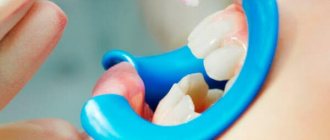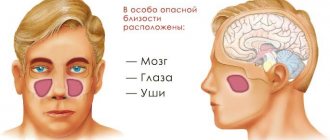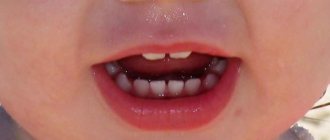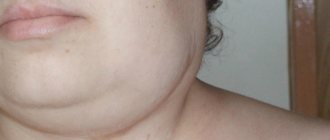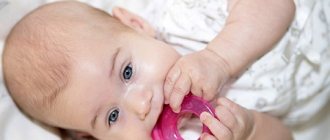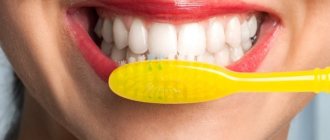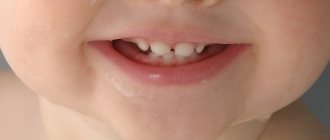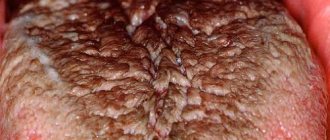High fever during teething is not uncommon in children. Young mothers and fathers have a hard time enduring this period, as they do not always understand why the temperature rises and when to bring it down.
Yes, teething is a difficult time for both the baby and his parents. But you need to survive it and try to alleviate the child’s suffering. How to do it? How to bring down the temperature and prevent it from rising again? Read more about this.
Teething symptoms
First of all, it’s worth saying a few words about the timing and symptoms of the appearance of the first teeth in babies.
This usually happens at 5-6 months, but this does not always happen. Some babies erupt their first tooth at 3-4 months, others only at 8-9 months. It all depends on the individual characteristics of the body. For example, teeth appear later in children with a lack of calcium in the body, as well as in children with signs of rickets.
As for the symptoms accompanying teething, these include:
- increased salivation;
- frequent crying;
- irritability and anxiety;
- poor sleep;
- facial redness;
- poor appetite;
- a constant desire to put something in your mouth.
Also, a fairly common sign that teeth are being cut is a high temperature. This is what we will talk about.
Why does the temperature rise during teething?
The human body is a system where all organs represent a single mechanism. When teething, the inflammatory process in the gums contributes to a decrease in immunity in the entire nasopharynx, which can cause a number of diseases: stomatitis, sore throat, etc. These lead to an increase in the temperature of the whole body.
As a rule, the temperature does not rise much - up to 37-37.5 degrees. But each body reacts differently, so there are cases of greater increases.
Useful: What do you need to know about atopic dermatitis in children?
Increased salivation can also be considered a protective reaction caused by decreased oral immunity.
When should you start knocking down?
The heat that occurs during teething does not make much sense if there are no associated infections. More often it is simply the body’s reaction to a complex process.
Therefore, the temperature can be lowered from any number if it brings particular concern to the baby.
But if the baby feels normal at temperatures up to 38 ° C - 38.5 ° C, then antipyretics will do more harm than good . Even seemingly safe drugs have several side effects.
Temperatures above 39 °C must be brought down in any case . It negatively affects many vital processes in a weakened child’s body.
If you cannot maintain normal levels on your own, you should seek medical help.
Fever is especially dangerous for children with neurological diseases, since the risk of complications in this case is much higher. For such children, antipyretic therapy should begin at 37.5 °C.
What temperature is possible during teething?
As mentioned above, when the baby’s first teeth peck, the temperature can rise to 37-37.5 degrees. This is normal, so don't worry or panic. Moreover, you should not bring down such a “heat” by stuffing your baby with medications. But it is important to constantly monitor the child’s condition and prevent further increases in temperature.
Sometimes, when teeth are being cut, the thermometer can rise to 38 degrees. This temperature is also normal, but you can begin to bring it down. To do this, use only mild, safe products. Especially if the baby is only 3-4 months old.
In very rare cases, the temperature when the first teeth appear can rise to 39 degrees or higher. In this case, the fever may be accompanied by cramps, difficulty breathing and other dangerous symptoms. You must call an ambulance immediately.
Is it necessary to lower the temperature?
It has already been said above that there is no need to bring the temperature down below 38 degrees, even using relatively safe means.
In general, a temperature of 38-39 degrees does not always require that it be brought down, especially when it comes to six-month-old babies.
There is no need to give your child an antipyretic if he is alert, active and nothing is bothering him.
Important!
Before lowering the temperature, make sure that this is a consequence of teething. It may be that the child’s body is fighting an infection that arose in parallel with the appearance of teeth. In this case, urgent consultation with a doctor is necessary.
What to do if you have a high temperature
If a child is teething, it is necessary to alleviate his condition and bring him back to normal as soon as possible. This can be done very simply: start taking Dantinorm Baby solution, which was created by specialists just for these purposes. The unique formula, which has been used for the youngest patients for many years, contains only natural ingredients.
Due to the duration of action of each dose of the drug, just three doses per day provide continuous protection for the baby from all the main symptoms of teething for 24 hours a day. Your baby will no longer experience irritation and tearfulness and will finally fall asleep in a sound, healthy sleep! And, of course, he will thank you very much for this!
Body temperature can change not only when baby teeth erupt. Most often, it becomes critical when changing the milk “set” to a permanent one. In this case, the child cannot yet explain what is bothering him.
How to help your baby teething? Temperature can be either physiologically normal or a sign of a disease, such as gingivitis.
To figure out whether it is necessary to reduce the temperature caused by teething, it is necessary to determine the reason why it increased. If this happened for a natural reason, then there is practically nothing to help. Komarovsky says that it is impossible to reduce the temperature to 39 degrees. In the second case, the temperature does not affect the teeth in any way, and it can be eliminated by eliminating the disease that causes this negative symptom.
Normal body temperature for a child
Often parents feverishly try to cure their child with serious antiviral and antibacterial drugs. Sometimes it comes to the point that parents heal babies in the first weeks of their life and create for them “an excellent foundation for the future” in the form of chronic diseases. Taking pain medication without consulting a doctor is a bad idea.
Most parents do not know how many degrees Celsius should be the normal body temperature of a child who is cutting a full-fledged dental plate. Dr. Komarovsky said that a temperature of 37 °C or higher (up to 38 °C) is normal. In this way, the body resists unfavorable conditions and enhances the process of producing antibodies. That is why it is impossible to intervene radically.
But we also cannot ignore what is happening. When the fever has reached 38 °C or higher, and teeth are cutting very slowly, you need to visit a doctor who will prescribe a suitable antipyretic drug. It is especially important to do this if the temperature lasts for a long time.
How many days can a high temperature normally last? Experts convince that she should torment the child for no longer than 3 days. Otherwise, this indicates serious health problems. If there is a runny nose during teething, then this indicates that it is time to go to the doctor, who will tell you what to do in this or that case.
In the video, the pediatrician talks about how you can help your child with fever during teething:
What are the dangers of high temperature?
It is difficult to accurately assess the dangers of high fever in young children. Often it is only the body’s protective reaction to infections and viruses. But this doesn't always happen.
A fever in a child can be quite dangerous, as it negatively affects the functioning of the heart and liver. Also, high temperature is dangerous for brain activity, and the younger the child, the greater this danger.
It is important to monitor the child’s condition and prevent a rapid rise in temperature.
When teething, heat can have dangerous consequences:
- convulsions;
- dehydration;
- malfunction of the nervous system;
- heavy load on the heart and liver;
- slow or rapid breathing.
Signs of teething in a baby
Teething occurs normally in a child. That is, it is a physiological process. If you examine the baby’s oral cavity, you can see the following main signs:
- strong secretion of saliva that flows from the child’s mouth (this is a protective reaction of the body aimed at eliminating pathogenic microorganisms in the oral cavity);
- gums swollen, hyperemic;
- refusal to eat;
- chewing foreign objects, for example, TV remote control, toys;
- disorder of stool formation accompanied by diarrhea;
- Teeth may be visible on the gums, indicating their approach.
No other foreign formations should appear in the mouth. The child becomes whiny and irritable. He constantly demands the breast or bottle for food. This calms him down. Strong crying occurs throughout the day, but intensifies at night.
If the temperature is associated with teeth, immediately after teething the low-grade fever will end. This distinguishes it from a cold. The indicator will return to normal, the child will stop crying often and being restless. The condition is often observed during the eruption of fangs. But in some children it can appear on all teeth.
How to reduce fever in babies?
There are two ways to bring down a fever in a baby: medication and folk methods. The first method is faster, but it is not as gentle as the second. Each mother decides for herself what to use, but before lowering the child’s temperature, it is necessary to consult a doctor.
Medication method
This implies the use of mild antipyretics. It is worth clarifying once again that only a doctor can prescribe them.
For children they usually prescribe:
- "Kamistat";
- "Doctor Baby"
- "Kalgel";
- "Ibuprofen";
- "Panadol";
- "Solcoseryl";
- "NICE";
- "Cefekon";
- "Efferalgan."
For children who are teething, it is worth choosing the most convenient forms of medication.
- Suppositories are the most acceptable dosage form. The candles last quite a long time - about 5-6 hours. But you need to wait about half an hour for the result.
- Gels and pastes - many of them have a cooling effect, so they not only reduce fever, but also relieve discomfort in the child’s gums.
- Syrup – it is convenient because it has a pipette dispenser. In addition, the syrup tastes good, and the baby will swallow it without resistance.
It is better to choose medications that are based on paracetamol, an antipyretic that is safe for babies.
Helpful: What can cause acetone in a child?
But giving aspirin and analgin to children is prohibited.
Folk way
If you are not a fan of pharmaceutical products and want to do without them, try the following ways to bring down the fever when teething.
- Provide your baby with plenty of fluids. It is better to give him warm compote, milk, herbal tea or just water.
- Ventilate the room. Make sure that the room is not stuffy or hot.
- Don't wrap the baby up. Let him be dressed lightly and comfortably.
- Wipe your baby with warm water, and you can also bathe him in a bath, the water in which is a couple of degrees lower than the temperature of the human body.
- Make a cabbage wrap. Dip fresh cabbage leaves into boiling water for a few seconds, beat them, cool them and apply them to the baby’s body and head. The sheets can be secured with clothing.
These and other actions can be performed both in combination and separately. The main thing is to carefully monitor the child’s condition at all times and, if it worsens, consult a doctor immediately.
How to alleviate the baby's condition?
Modern pharmacology produces many drugs to relieve unpleasant symptoms during this period of a baby’s life. Cooling gels for gums during teething (Dentol, Kalgel, etc.) have a local analgesic effect and reduce the manifestations of inflammation.
But you should not overuse such gels, because their frequent use can slow down the growth process.
Homeopathic suppositories Viburkol and Dentokind tablets are complex remedies for eliminating unpleasant symptoms during teething. These drugs include antispasmodic, anti-inflammatory and sedative components.
They are effective for minor ailments: slight fever, painful sensations in the gums, poor sleep. These drugs should be used after consultation with a pediatrician and starting with the minimum dosage, as cases of allergic reactions have been recorded.
We invite you to find out the price of veneers—onlays for teeth that are so popular today.
In this publication we will tell you how to treat stomatitis in children’s mouths at home.
Here: https://zubovv.ru/detskaya-stomatologia/d-zubi/skrezhet-bruksizm-vo-sne.html - you will find out why severe teeth grinding in a child’s sleep is dangerous.
What not to do?
Many parents, wanting to help their child, make many mistakes and take actions that are completely unnecessary. Remember that the appearance of teeth is a natural process that has existed from time immemorial. Nature is wise, and there is no need to help her.
- Do not give your baby crusts of bread, cookies or other foods that can crumble and injure the baby's gums.
- There is no need to rub your gums with your finger or use other methods to “help” teeth erupt.
- Do not overtire your child by distracting him with toys and exhausting him with games.
- Do not give your baby objects that could scratch the mucous membrane.
- Do not wipe your baby with alcohol or vinegar.
- You cannot “bundle” the baby.
- Do not give your baby strong antipyretics.
